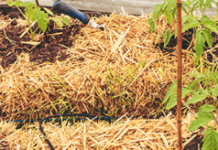Janet Hackert, Nutrition and Health Education Specialist, Harrison County, University of Missouri Extension
When it comes to seasonings the first ones that often come to mind are salt and pepper, but there are many others, including herbs, that can be homegrown. Peppers and onions are not uncommon in home gardens. Herbs and other seasonings like horseradish are also options.
According to The Visual Food Encyclopedia, herbs are “green-leafed plants indigenous to temperate zones,” as opposed to spices which are “aromatic substances derived from plants native to tropical regions and are generally characterized by their pungent flavor.” Herbs include basil, marjoram, mint, oregano, rosemary, sage, thyme, dill, aniseed, caraway, coriander, cumin, fennel and parsley, to name just a few.
MU Extension publication G6470, Growing Herbs At Home, explains how to propagate, grow and harvest herbs. Herbs can be refrigerated, frozen or dried to prolong their use. A tablespoon of fresh herbs has about the same flavoring ability as a teaspoon of dried herbs. Generally the older the herb, the less fragrance or flavor it will impart to food.
Here are some tips for using herbs effectively:
- Chopping fresh herbs helps to release their flavor. Use clean kitchen scissors or a sharp knife to chop them without crushing the leaves.
- The heat involved in cooking helps free the essential oils that give herbs their wonderful fragrances.
- To trap these flavors, keep the pot covered when cooking liquids with herbs in them, such as spaghetti sauce or soups.
- Do not add fresh herbs and spices during the hottest part of the cooking process. Rather, if high heat is to be used, wait to add the seasonings until the dish is simmering or closer to the end of the process.
- If using dried herbs, add these to slow-cooked dishes like pastas, stews, soups and casseroles. Incorporate them early on so they have time to rehydrate and infuse their flavor throughout the dish.
- When preparing cold dishes, add herbs early to allow enough time for flavors to penetrate throughout the food.
Storing herbs well can prolong their shelf life and keep them flavorful:
- Fresh herbs can be kept fresh for up to a week by snipping the ends of their stems, wrapping them in wet paper towels, placing in a plastic bag and storing in the produce bin of the refrigerator.
- If you have more fresh herbs than you can use, the rest can be dried or frozen for later use. Start by washing the plants in cool water and gently patting them dry.
- To freeze herbs, there are a couple options. Strip the leaves off the stems and place them in the freezer in a single layer on a cookie sheet. Or crush the leaves and freeze them in ice cube trays, with the option of adding water or oil to each cube depending on their intended use. Once frozen, move the herb leaves or cubes to a freezer container — be sure to add a label and date.
- To dry herbs, spread the leaves out in a single layer and put them in a dark, dry place with good air circulation. Ideal drying temperature is between 70 and 90 degrees F and drying takes three to four days. For herbs with small leaves, like rosemary and oregano, keep them on the stem and then strip the leaves after drying.
- Dried herbs will last up to one year if stored in airtight containers, out of direct light and away from strong heat. Keeping them dry is also key to retaining their flavor.
Be creative when experimenting with herbs and food preparation. Try tossing a few fresh, chopped basil leaves into a salad of spinach or other dark greens — the basil gives enough flavor that little if any salad dressing is needed. Adding aniseed or dill to spring vegetables creates a new taste sensation. Put dried tarragon or sage in a shaker to sprinkle on chicken or turkey instead of salt. For more ideas, download a free copy of MU Extension publication N362, Herbs and Spices, which has lists of common herbs and spices and the best foods or dishes to use them in.
The benefits of using herbs to season food is that you will find new and enjoyable flavors, and you can avoid or reduce the use of unhealthy flavoring options like salt or salad dressings.



